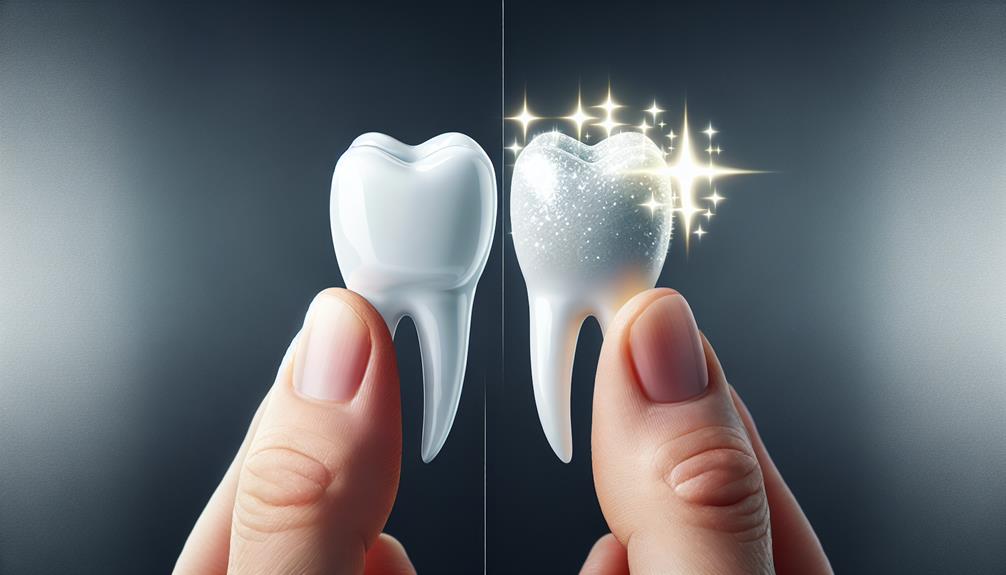If you're seeking safe ways to whiten your sensitive, stained teeth, opt for gentle whitening products with lower bleaching agent concentrations and enamel protection ingredients like potassium nitrate. Consider using toothpaste tailored for sensitive teeth and consulting with a dentist for personalized care. By prioritizing your oral health and choosing products designed to minimize sensitivity, you can achieve a brighter smile comfortably.
Key Points
- Choose gentle whitening products with low bleaching agent concentrations.
- Opt for enamel protection ingredients like potassium nitrate.
- Consider natural remedies like oil pulling and baking soda paste.
- Use desensitizing toothpaste for managing sensitivity during whitening.
- Consult a dentist for personalized advice on safe whitening methods.
Causes of Teeth Staining
Staining on teeth is commonly caused by various factors such as diet, smoking, and certain medications. The foods and beverages you consume, like coffee, tea, red wine, and berries, can stain your teeth over time. Smoking not only affects your overall health but also leads to tooth discoloration. Additionally, some medications such as antihistamines, antipsychotic drugs, and high blood pressure medications can contribute to staining.
To prevent discoloration and protect your tooth enamel, it's essential to practice good oral hygiene. Brushing your teeth at least twice a day, flossing daily, and using a fluoride toothpaste can help maintain the whiteness of your teeth. Avoiding tobacco products and limiting consumption of staining foods and drinks can also aid in preventing further discoloration.
Regular dental check-ups and professional cleanings are vital for monitoring your oral health and addressing any potential staining issues early on. Remember, protecting your tooth enamel is key to maintaining a bright and healthy smile.
Best Practices for Sensitive Teeth
To alleviate discomfort and maintain oral health, implementing proper care techniques is essential for individuals with sensitive teeth. Here are some best practices for sensitivity management and tooth whitening options:
- Use a Soft-Bristled Toothbrush: Opt for a toothbrush with soft bristles to prevent further irritation to sensitive teeth. Brush gently in circular motions to clean effectively without causing additional discomfort.
- Avoid Acidic Foods and Beverages: Acidic substances can wear down tooth enamel, leading to increased sensitivity. Limit consumption of citrus fruits, sodas, and other acidic foods to preserve your enamel and reduce tooth sensitivity.
- Consider Desensitizing Toothpaste: Desensitizing toothpaste can help manage tooth sensitivity by blocking the transmission of pain signals from the tooth surface to the nerve. Look for toothpaste specifically designed for sensitive teeth and use it consistently for best results.
Gentle Whitening Products
When searching for gentle whitening products for sensitive teeth, it's important to prioritize formulations designed to minimize sensitivity while effectively brightening your smile. Opt for products that offer a sensitive formula specifically tailored to reduce discomfort during the whitening process. These formulas typically contain lower concentrations of bleaching agents such as hydrogen peroxide, which can be harsh on sensitive teeth.
Additionally, choose products that provide enamel protection to safeguard your teeth from damage. Enamel protection is vital as it helps maintain the strength and integrity of your teeth while whitening agents work on removing stains. Look for ingredients like potassium nitrate or fluoride, which can help strengthen enamel and reduce sensitivity.
Natural Remedies for Stains
For individuals seeking natural remedies to address teeth stains, exploring alternative options can provide a more gentle approach to whitening sensitive teeth. Here are some herbal solutions, DIY methods, organic alternatives, and home remedies that you can consider:
- Oil Pulling: This ancient practice involves swishing oil around in your mouth to reduce bacteria and whiten teeth naturally. Coconut oil is a popular choice for its antimicrobial properties.
- Baking Soda Paste: Mixing baking soda with a small amount of water to create a paste can help gently scrub away surface stains on teeth. It's important not to use this method too frequently to avoid damaging enamel.
- Strawberries and Baking Soda: A mixture of mashed strawberries and baking soda can act as a natural teeth whitening agent. The malic acid in strawberries helps break down stains, while baking soda helps scrub them away gently.
These organic alternatives and home remedies offer a natural way to combat teeth stains without harsh chemicals, making them suitable for those with sensitive teeth.
Precautions for Sensitive Teeth
Considering the sensitivity of your teeth, taking precautions to safeguard against discomfort and potential damage is essential. When dealing with sensitive teeth, it's vital to opt for toothpaste specifically designed for this issue. Sensitive toothpaste options such as those containing potassium nitrate or strontium chloride can help alleviate discomfort while still providing effective cleaning. These toothpaste varieties work by desensitizing the nerve endings in your teeth, making them less reactive to triggers like hot or cold temperatures.
If you're contemplating professional whitening treatments, consult with your dentist to make sure they're suitable for your sensitive teeth. Dentists can offer specialized whitening treatments that are gentler on sensitive teeth, minimizing the risk of irritation and pain during the process. Professionals can also tailor the treatment to your specific needs, ensuring that your teeth are safely whitened without exacerbating sensitivity. By being proactive and seeking professional advice, you can achieve a brighter smile without compromising the health of your sensitive teeth.
Frequently Asked Questions
Can Whitening Sensitive Stained Teeth Cause Damage to the Enamel?
When whitening sensitive stained teeth, it's essential to prioritize enamel protection. Gentle whitening techniques can help maintain tooth health while addressing sensitivity. Be mindful of the products you use to guarantee a safe and effective whitening process.
Is It Safe to Use Whitening Strips on Sensitive Teeth?
Using whitening strips on sensitive teeth can be safe if done correctly. However, if you're concerned about potential sensitivity, consider alternative treatments such as natural remedies like baking soda or activated charcoal for a gentler approach.
How Long Will It Take to See Results When Using Gentle Whitening Products?
When using gentle whitening products, you may start noticing results in about 1-2 weeks. However, consider sensitivity risks and always follow instructions for enamel protection. Results vary, so be patient and consistent for best outcomes.
Are There Any Dietary Changes That Can Help Prevent Further Staining on Sensitive Teeth?
To prevent further staining on sensitive teeth, consider lifestyle modifications and dietary adjustments. Incorporate natural remedies and preventive measures. Avoid acidic foods, sugary drinks, and tobacco products. Opt for enamel-friendly snacks like crunchy fruits and vegetables.
Can Teeth Whitening Procedures Worsen Existing Tooth Sensitivity?
To manage tooth sensitivity during whitening, follow precautions like using desensitizing toothpaste pre-treatment. Protect gums with barrier gels and opt for lower concentration bleaching agents. Consult your dentist for personalized guidance on minimizing sensitivity risks.
Conclusion
To sum up, when dealing with sensitive stained teeth, it's important to use gentle whitening products and natural remedies to avoid further irritation. Are you ready to brighten your smile without causing discomfort?
By following these safe methods and precautions, you can achieve a whiter smile while protecting your sensitive teeth. Remember to always consult with your dentist before starting any new whitening regimen.



